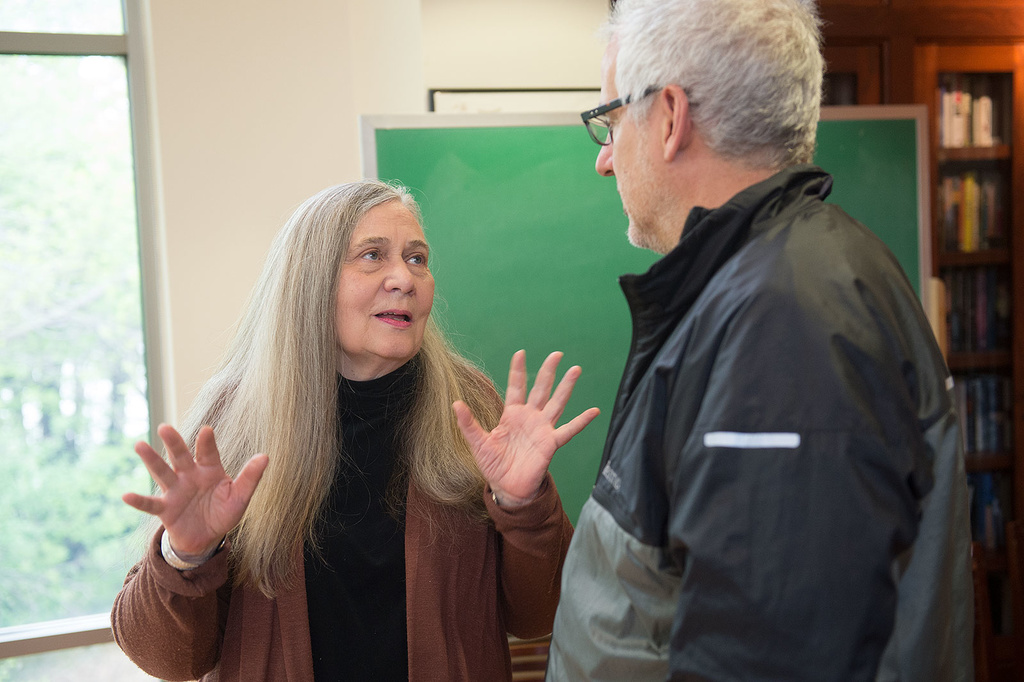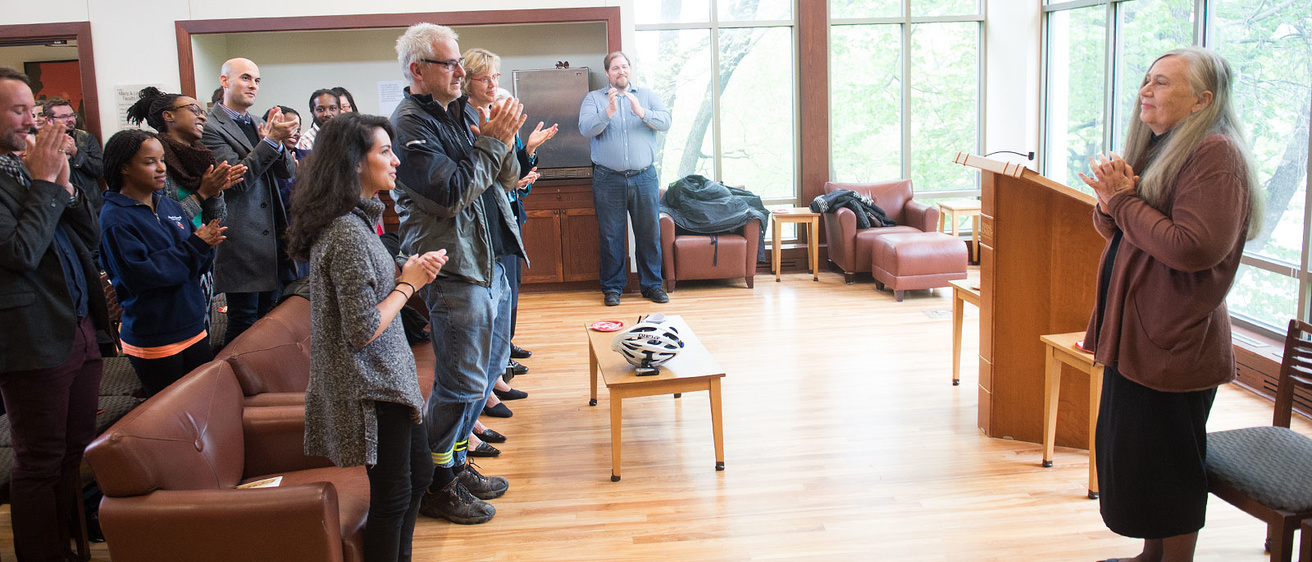Longtime Iowa Writers' Workshop instructor Marilynne Robinson says she knew when she first came to the University of Iowa as a visiting professor it would be a good fit.
On the heels of her retirement 25 years later, she says she is proud to attest to the quality of the university and the workshop.
"This is a good, vigorous, idealistic, high-achieving academic environment,” Robinson says. “I'm very proud to be associated with it.”
Robinson is the F. Wendell Miller Professor of English and Creative Writing and upon retirement will assume the title of professor emerita. She is one of the UI's most recognized faculty members, having won numerous accolades throughout her career, including the 2005 Pulitzer Prize for fiction, the 2012 National Humanities Medal, and the 2016 Library of Congress Prize for American Fiction. She also landed on Time magazine's "100 Most Influential People" of 2016.
"She's the most distinguished writer working in America today," says Lan Samantha Chang, Writers' Workshop director and Robinson’s former student. "She has contributed an enormous amount to American literature."
Born and raised in Sandpoint, Idaho, Robinson received a Ph.D. in English from the University of Washington in 1977. Three years later, she released her first novel, Housekeeping, to immediate critical acclaim; the book was nominated for the Pulitzer Prize. Robinson began teaching at the Writers' Workshop in 1991 and soon became one of the most influential instructors in the program and a nationally respected figure.
"She's changed the lives of some of her students—many of them have gone on to have successful careers," says Chang. "Some have even come back to teach here."
Robinson's list of protégés includes Chang, author of Hunger (1998); visiting faculty member Paul Harding, author of Tinkers (2009); and assistant professor Ayana Mathis, who wrote The Twelve Tribes of Hattie (2012).
Robinson says being a teacher constantly refreshed her awareness of the finer points of writing.
"We have the incredible good fortune of being overwhelmed by interesting applicants," Robinson, 72, says of the workshop. "People often ask me if I'd have written more if I hadn't been teaching, and who knows? But it has been very stimulating for me."
"We don't feel like we're really saying goodbye to her. Her view of the world, her capacious mind, her imagination, her compassion—they're still here because they're in everybody who's ever worked with her."
—Lan Samantha Chang, Iowa Writers' Workshop director
In 2004, Robinson published her second novel, Gilead, which won the Pulitzer Prize for fiction in 2005 and garnered her renewed attention from the literary community. The book also earned her the admiration of President Barack Obama, who she first met in 2012 when she received the National Humanities Medal.
Obama read Gilead while on the campaign trail in 2007 and called the book one of his favorites in 2015 when he interviewed Robinson in Des Moines. She has since completed the Gilead trilogy with the novels Home (2008) and Lila (2014).
"It's a wonderful privilege to talk with President Obama,” Robinson says, calling it one of biggest honors of her career. “He's a brilliant, interesting man.”
The workshop seminars she taught were regularly filled with both members of the UI and the greater Iowa City community. Mary Harreld, wife of UI President Bruce Harreld, recently began attending.
"I had read all of Marilynne’s novels—Gilead twice—so the opportunity to actually listen to Marilynne teach was exciting and a little intimidating," Mary Harreld says. "I am sure, even as she enters this new phase of her career, we will continue to be the beneficiaries of Marilynne’s literary genius."
Likewise, Derek Willard, emeritus faculty in the UI College of Dentistry, says he was drawn to Robinson’s seminars because of her power as a “master teacher.”
"When I retired four years ago, Marilynne invited me to attend her workshop seminars regularly as a guest," Willard says. "She communicates to students the utter importance of their work and her sure knowledge of the impossible hopes and fears they face."

As Robinson prepares to leave the program that has been her home for more than two decades, she says she is excited to continue her academic and literary career.
"I have agreed to do a series of eight lectures at Cambridge University for their divinity school," she says. "I have other speaking commitments as well, and I'm of course looking forward to getting back to my fiction."
Robinson says she is confident the workshop's strong leadership and standard of excellence will continue to attract exceptional talent even after her departure.
"I think the workshop has had some good development over the last five to ten years, not coincidentally associated with Sam Chang," she says. "I have a lot of faith in it, and there's a great deal of morale here."
With family in Iowa City, she says she plans to remain connected to the community and has not ruled out teaching an occasional seminar.
"We don't feel like we're really saying goodbye to her," says Chang. "Her view of the world, her capacious mind, her imagination, her compassion—they're still here because they're in everybody who's ever worked with her."
